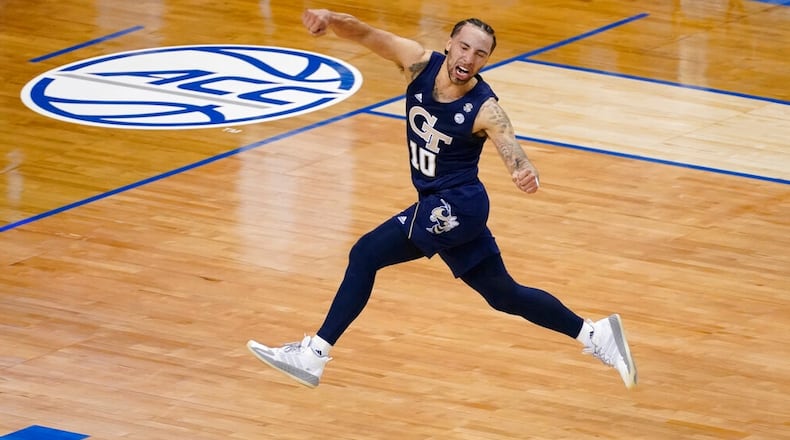Bill Bradley once told me, “An erratic point guard keeps both teams in the game.” This Bill Bradley wasn’t the one who scored 58 points in 1965 for Princeton against Wichita State in the third-place game, which no longer exists, of the Final Four, which wasn’t yet known as such. This Bill Bradley was my dad, who played left halfback for Paintsville High. But I digress.
For the longest time, Jose Alvarado seemed — to me, if not necessarily to everyone — such a point guard. His strengths were obvious: He’s fast and fearless. His excesses were, too: He’d shoot his team into a lead, and he’d shoot it out again. There was a reason some wondered if he was a point guard of ACC caliber. That number, it must be said, did not include his coach.
Once or twice, I mentioned Alvarado and gave an eye-roll. And Josh Pastner would say to me, “I love that kid.” No hesitation. No equivocation. No “we’ve-got-to-take-the-good-with-the-bad.” For Pastner, there was no downside. For Pastner, Alvarado was always the guy to lead Georgia Tech upward and onward. Lo and behold, he has.
Alvarado was just named the ACC’s defensive player of the year. He’s 6-foot. Some NBA types — Billy Knight, the former Hawks’ general manager, was one — are reluctant to invest in small guards because they tend to be swinging gates on defense. If you watched Tech beat Florida State for the ACC title, you saw the darnedest thing: You saw the smallest man on the floor boss the game, and not because he was sailing in 3-pointers, a la Stephen Curry or Trae Young. (Alvarado was 0-for-4 on treys Saturday night.) Alvarado dominated because he got his hands on everything.
He made five steals. I don’t know how many deflections he made, but I’m guessing more than five. FSU was so flustered it made 25 turnovers, which is unthinkable for a team of such talent and seasoning. By game’s end, the Seminoles weren’t worried about getting their shots blocked by Moses Wright; they were terrified by the smallish man sneaking up behind them. I’ve seen a few basketball games in my time. I’m not sure I’d seen one quite like this.
The history of Georgia Tech basketball — the good times, anyway — is of point guards. Mark Price was Bobby Cremins’ first big recruit, the New Yorker somehow persuading a kid from Enid, Okla., to come East, as opposed to staying near home and teaming at Oklahoma with a coveted big man named Wayman Tisdale.
Cremins lured Kenny Anderson of Queens’ Archbishop Molloy away from North Carolina, where Kenny Smith, also of Molloy, had become a star. By the end of his freshman year, Anderson was the best player in the land and Tech was in the Final Four. Anderson was likewise 6-foot, but he could get anywhere he wanted to go and do everything he needed to do. He remains the greatest collegiate point guard I’ve seen in person. (And yes, I saw Isiah Thomas.)
After Anderson came Travis Best, who presided over Tech’s 1993 ACC championship. After Best came Stephon Marbury, who’d been the nation’s top signee — Darcy Frey wrote a book, “The Last Shot”, about his recruitment — and who led Tech back to the NCAA Tournament after a two-year absence.
Paul Hewitt, Cremins’ successor, took Tech to the 2004 Final Four with a point guard — see if this sounds familiar — whom rival coaches weren’t sure was cut from ACC cloth. That PG was Jarrett Jack, who steered the Jackets to five hairbreadth victories en route to the championship game against UConn. In the Elite Eight victory over Kansas in St. Louis, Jack had 29 points, nine rebounds and six assists.
Credit: AP Photo/Gerry Broome
Credit: AP Photo/Gerry Broome
Alvarado isn’t like his distinguished predecessors. He wasn’t a McDonald’s All-American. ESPN ranked him the 33rd-best point guard in his class. He arrived at a different Georgia Tech from the one Cremins resurrected. The ACC had grown to 15 teams, and the Jackets had fallen so far there was no guarantee they could keep up with Boston College and Pitt, let alone Duke and North Carolina.
Today the Jackets are an ACC champion for the first time since 1993 and an NCAA Tournament qualifier for the first time since 2010. None of this would have happened without Alvarado, whose full worth remains difficult to quantify. The first words in his official Tech bio are “tough” and “gritty,” as opposed to “talented” or “skilled.” Which isn’t to say he’s not talented or skilled – he demonstrably is. But he isn’t the leader of a championship team on the strength of his physical gifts. He’s a champ because he plays so darn hard, even when he’s hurting.
By now you’re saying, “Sounds like Bradley has come around,” and you’re correct. I no longer watch for those moments when Alvarado slings a pass out of bounds. To his credit, his bravado no longer outstrips his savvy. Tech wouldn’t be where it is without Wright or Michael Devoe — and don’t forget Jordan Usher — but there’s no denying that Alvarado is, borrowing from baseball’s Mr. October, the straw that stirs this drink.
These Jackets believe in themselves. The biggest reason they believe is that their point guard is a Brooklynite who doesn’t take a backward step against any opponent, be it Carolina or Duke or FSU. After Saturday’s championship game, esteemed AJC colleague Ken Sugiura asked Alvarado about the defensive exhibition he’d authored.
Said Alvarado: “Hey, who’s the defensive player of the year in the ACC?”
Said Ken: “I believe it’s you.”
Said Alvarado: “That’s exactly why. That’s exactly my answer, man.”
His college coach has always loved Jose Alvarado. This former skeptic has come to like him a lot.
About the Author
The Latest
Featured




